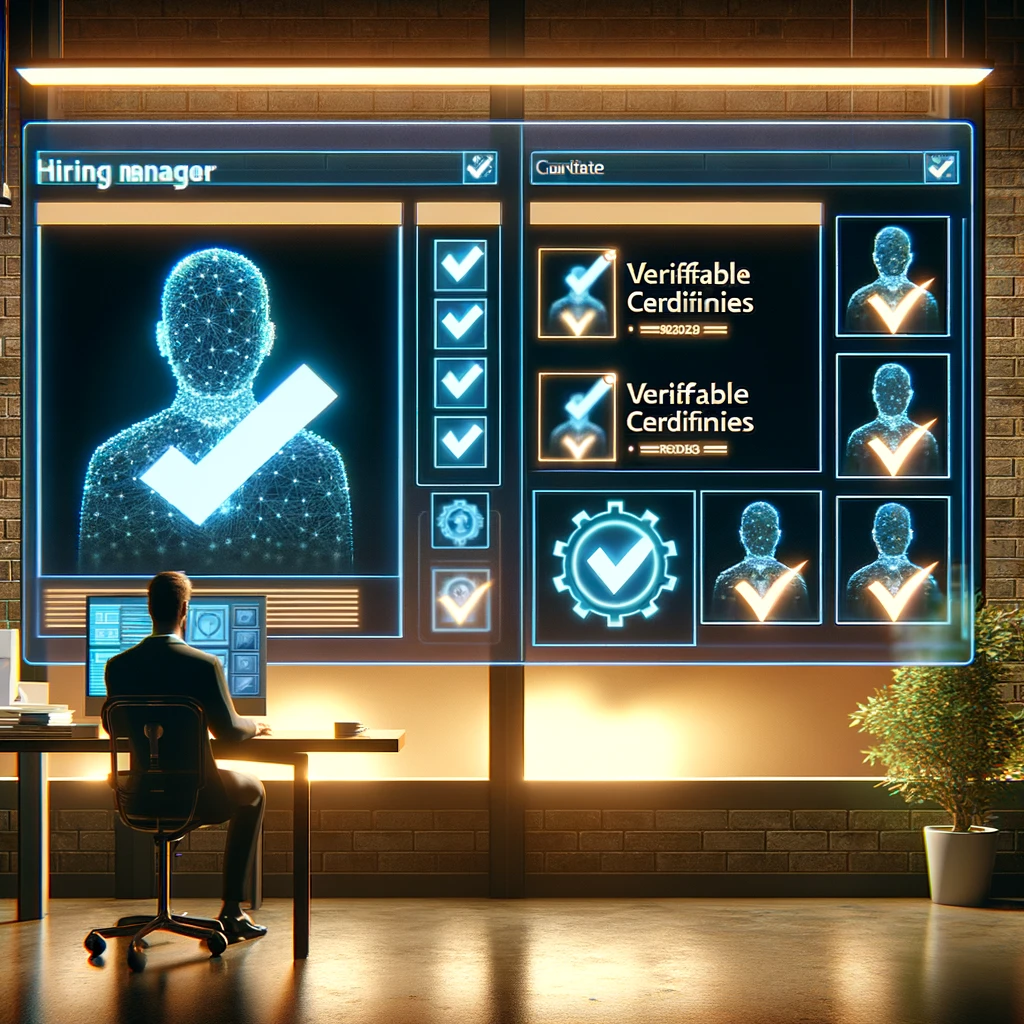- Home
- /
- Thought Leadership
- /
- Verifiable Credentials: The Foundation of an Ethical AI-Powered Future
Verifiable Credentials: The Foundation of an Ethical AI-Powered Future
Artificial Intelligence is a revolutionary force reshaping industries, redefining human interactions, and presenting unprecedented opportunities for innovation. However, the potential of AI extends beyond its technical capabilities, touching upon the very fabric of societal ethics and trust. Central to realizing this potential in a manner that aligns with ethical principles is the integrity and reliability of the data that fuels AI systems. Herein lies the significance of Verifiable Credentials (VCs), a technology that ensures the authenticity and integrity of data about individuals, institutions, and assets.

Verifiable Credentials are digital attestations that link a subject to a claim, verified by a trusted issuer and cryptographically secured. This technology embodies the principle of trust in the digital realm, ensuring that information is accurate, tamper-proof, and verifiable. In the context of AI, where decision-making processes heavily rely on data, the role of Verifiable Credentials becomes not just beneficial but foundational. By guaranteeing that the data inputs are trustworthy, VCs pave the way for AI applications that are not only more reliable but also more ethical and accountable.
As we stand on the brink of an AI-powered future, the discourse around the ethical implications of AI has never been more pertinent. Concerns about privacy, data manipulation, and the opacity of AI algorithms underscore the need for a robust framework that can instill trust and transparency in AI systems. Verifiable Credentials offer a beacon of hope in this regard, providing a mechanism to authenticate and validate data in a manner that respects user privacy and control.
Our goal with this post is to explore the vital role Verifiable Credentials play in fostering an ethical AI-powered future. We will explore how VCs can ensure the trustworthiness of data in AI systems, thereby enhance transparency, accountability, and user privacy.
The Importance of Trustworthy Data in AI
At the heart of every AI system lies data, the foundational building block that informs, guides, and shapes the decision-making processes of artificial intelligence. The quality, integrity, and reliability of this data are paramount, as they directly influence the outcomes, effectiveness, and ethical implications of AI applications. This section explores the critical role of trustworthy data in AI, the repercussions of its absence, and the stark examples that highlight the necessity of data integrity.

A. Role of Data in AI Decision-Making Processes
AI systems, from simple machine learning models to complex neural networks, rely on vast amounts of data to learn, adapt, and make predictions or decisions. This data can encompass a wide range of information types, including personal identifiers, financial records, medical histories, or even behavioral patterns. The accuracy and reliability of this data are crucial, as they underpin the AI’s ability to function effectively and ethically. Trustworthy data ensures that AI systems can make informed decisions that are fair, unbiased, and reflective of the real world.
B. Consequences of Using Unreliable or Unverified Data
The use of unreliable or unverified data in AI systems can lead to a multitude of negative outcomes. At best, it can result in inefficiencies or inaccuracies in the AI’s outputs. At worst, it can lead to significant ethical breaches, including discrimination, privacy violations, and the propagation of false information. For instance, an AI system trained for hiring purposes might inadvertently discriminate against certain groups if the underlying data reflects historical biases. Similarly, AI applications in healthcare that rely on flawed data can lead to misdiagnoses or inappropriate treatments, endangering lives.
C. Examples of AI Failures Due to Poor Data Quality
Real-world examples underscore the ramifications of using poor-quality data in AI systems. One notable instance involved a renowned AI chatbot that began to produce offensive and inappropriate content after being exposed to negative inputs from users. Another example can be seen in facial recognition technologies, where biases in training data have led to higher rates of misidentification among certain ethnic groups. These cases highlight not only the technical limitations that arise from unreliable data but also the profound ethical and societal consequences.
The critical nature of trustworthy data in AI underscores the need for mechanisms that can verify and authenticate data sources and content. As AI continues to permeate various facets of life, the demand for such mechanisms will only grow, further emphasizing the importance of technologies like Verifiable Credentials in building a more ethical, AI-powered future.
Understanding Verifiable Credentials

In the context of building ethical AI systems, the concept and technology of Verifiable Credentials (VCs) emerge as a pivotal solution to the challenges surrounding data trustworthiness. Below, we will dive into the technical underpinnings of VCs, their key features, and the standards that govern their use, illustrating how they can serve as a linchpin for integrity and trust in AI applications.
A. Technical Workings of Verifiable Credentials
Verifiable Credentials are digital claims that are made by an issuer about a subject, which can include individuals, organizations, or objects. These credentials are cryptographically secure, making them tamper-evident and ensuring their authenticity can be verified by anyone. The process involves three primary entities: the issuer (entity that creates and attests to the VC), the holder (entity that possesses the VC), and the verifier (entity that checks the validity of the VC). VCs leverage public key infrastructure (PKI) to enable this secure and verifiable exchange of information, ensuring that only the holder can present their credentials and only entities with the correct public keys can verify their authenticity.
B. Key Features: Tamper-Evidence, Privacy, and User Control
Verifiable Credentials are designed with several key features that make them ideal for ethical AI applications:
- Tamper-Evidence: The cryptographic signatures used in VCs ensure that any alteration to the credential after it has been issued is detectable. This guarantees the integrity of the data contained within the VC.
- Privacy: VCs can be designed to reveal only the minimum amount of information necessary for the verification process. This selective disclosure protects the privacy of the credential holder, ensuring that personal data is not unnecessarily exposed.
- User Control: Holders of VCs have control over their credentials, including what information is shared and with whom. This empowers individuals and organizations to manage their digital identities and the sharing of their personal data.
C. Standards and Protocols
The widespread adoption and interoperability of Verifiable Credentials are facilitated by a set of standards and protocols, primarily developed by the World Wide Web Consortium (W3C). The W3C Verifiable Credentials Data Model provides a standardized framework for expressing credentials in a way that is machine-readable and interoperable across different systems and platforms. Additionally, Decentralized Identifiers (DIDs) are used in conjunction with VCs to provide a decentralized mechanism for identity verification, further enhancing the security and privacy aspects of digital credentials.
Understanding the technical foundation and key features of Verifiable Credentials elucidates their potential in creating a trustworthy framework for AI systems. By ensuring the integrity, privacy, and control of data, VCs not only address the immediate challenges of data quality in AI but also lay the groundwork for a more ethical and transparent digital ecosystem.
Verifiable Credentials as an Ethical Framework for AI
The integration of Verifiable Credentials (VCs) into AI systems presents a robust framework for addressing ethical concerns, primarily by ensuring the authenticity and integrity of data. This section explores the pivotal role of VCs in enhancing transparency, accountability, and privacy in AI applications, thereby contributing to a more ethical digital environment.

A. Ensuring Data Authenticity and Integrity
The cornerstone of ethical AI lies in the use of authentic and accurate data. VCs play a critical role in this regard by providing a mechanism for verifying the source and integrity of data. This verification process ensures that AI systems make decisions based on reliable and tamper-proof information, significantly reducing the risks of biases, errors, and unethical outcomes. For instance, in scenarios where AI is used for identity verification, VCs can confirm the authenticity of personal credentials without exposing sensitive information, thus maintaining data integrity.
B. Enhancing Transparency and Accountability in AI Systems
Transparency and accountability are fundamental to ethical AI practices. Verifiable Credentials contribute to these principles by enabling a traceable and auditable trail of data transactions. With VCs, it is possible to ascertain where data came from, who verified it, and how it was used by AI systems. This level of transparency allows for greater scrutiny and evaluation of AI decisions, fostering trust among users and stakeholders. Furthermore, in cases where AI decisions need to be contested or reviewed, the verifiable nature of the credentials facilitates accountability and rectification processes.
C. Protecting User Privacy and Data Sovereignty
One of the most significant ethical concerns in AI is the protection of user privacy and data sovereignty. VCs address these concerns by empowering individuals with control over their personal data. Through mechanisms like selective disclosure and consent-based sharing, VCs allow individuals to share only the necessary information with AI systems, safeguarding their privacy. Moreover, the decentralized nature of VCs ensures that users retain ownership and control over their credentials, reinforcing the concept of data sovereignty in the digital age.
The integration of Verifiable Credentials into AI systems not only mitigates the risks associated with unverified and potentially biased data but also aligns AI practices with ethical standards. By ensuring data authenticity, enhancing transparency, and protecting user privacy, VCs provide a comprehensive framework that supports the responsible development and deployment of AI technologies. As AI continues to permeate various aspects of society, the role of Verifiable Credentials in establishing trust and ethical integrity will become increasingly paramount, shaping a future where AI is both powerful and principled.
Use Cases of Verifiable Credentials in AI
The practical application of Verifiable Credentials (VCs) across diverse AI scenarios highlights their potential to address ethical challenges and enhance trustworthiness. This section examines specific use cases where VCs can significantly impact, illustrating how they contribute to creating a more ethical AI-powered ecosystem.

Identity Verification in Online Platforms
In the digital age, verifying the identity of users on online platforms is fraught with challenges, ranging from privacy concerns to the risk of fraudulent activities. AI, coupled with VCs, offers a solution by enabling secure and privacy-preserving identity verification processes. For instance, an AI system can use VCs to verify a user’s age or identity without accessing or storing sensitive personal information, thereby maintaining user privacy and enhancing trust in online interactions.

Education
In the education sector, the synergy between AI and VCs transforms the validation and sharing of academic credentials. VCs allow students and professionals to securely store and share their educational achievements with institutions and employers, ensuring the authenticity of their qualifications. AI can match individuals with personalized learning opportunities and career paths based on their verified credentials. This approach not only simplifies the admissions and hiring processes but also fosters a more tailored and effective educational experience.

Credentialing and Qualifications in Professional Settings
AI plays a growing role in recruitment, credential verification, and professional development platforms. VCs can ensure that the qualifications, certifications, and professional credentials presented by individuals are authentic and verified. This not only streamlines the hiring process but also mitigates the risk of fraudulent claims, ensuring that AI-based recruitment tools and professional networks operate with integrity and trust.

Talent Management
In the realm of talent management, AI and Verifiable Credentials (VCs) combine to revolutionize the way organizations assess, develop, and retain talent. VCs enable the secure and verifiable sharing of employee achievements, skills, and performance metrics. AI systems can analyze this data to identify skill gaps, predict future performance, and personalize development plans. This integration not only streamlines talent management processes but also enhances fairness and objectivity in employee evaluations, promoting a culture of meritocracy and continuous growth.

Supply Chain and Provenance Tracking
AI is increasingly used to enhance transparency and efficiency in supply chains. By integrating VCs, companies can provide verifiable evidence of the origin, handling, and authenticity of products. This is particularly relevant for industries where provenance and ethical sourcing are critical, such as food, pharmaceuticals, and luxury goods. VCs enable AI systems to verify and trace each step of the supply chain, ensuring ethical practices and enhancing consumer trust.
Health Data Management for Personalized AI Healthcare Solutions
In healthcare, AI has the potential to revolutionize diagnostics, treatment planning, and personalized medicine. However, the sensitive nature of health data raises significant privacy and ethical concerns. VCs can play a vital role by enabling secure and consent-based sharing of health records, allowing AI systems to provide personalized care while ensuring patient data privacy and security.
These use cases underscore the versatility and importance of Verifiable Credentials in facilitating ethical AI applications across various sectors. By providing a secure, privacy-preserving, and verifiable framework for data, VCs enable AI systems to operate with greater transparency, accountability, and trust. As the adoption of AI continues to expand, the integration of VCs will be instrumental in addressing ethical challenges and building confidence in AI-driven solutions.
Challenges and Considerations
While Verifiable Credentials (VCs) offer substantial benefits in fostering ethical AI applications, their implementation and widespread adoption are not without challenges. This section discusses the potential hurdles, legal and regulatory implications, and ethical considerations that must be navigated to fully realize the potential of VCs in ethical AI frameworks.
A. Scalability and Interoperability of Verifiable Credentials Systems
One of the primary challenges facing the adoption of VCs is ensuring their scalability and interoperability across various platforms and systems. As VCs become more prevalent, the need for standardized protocols and systems that can support a large number of credentials and users becomes critical. Additionally, interoperability between different VC systems is essential to ensure seamless verification processes across various sectors and applications. Addressing these challenges requires ongoing collaboration between technology developers, industry stakeholders, and standardization bodies.
B. Legal and Regulatory Implications
The implementation of VCs intersects with numerous legal and regulatory considerations, particularly concerning data privacy, security, and user consent. Regulations such as the General Data Protection Regulation (GDPR) in the European Union set strict guidelines for the handling of personal data, impacting how VCs can be used and shared. Navigating these legal frameworks while ensuring that VCs enhance user privacy and data protection is a complex challenge that requires careful planning and compliance strategies.
C. Ethical Considerations in Implementation and Governance
Beyond technical and legal challenges, the deployment of VCs in AI systems raises important ethical questions. Issues such as digital identity ownership, the potential for exclusionary practices, and the ethical use of personal data must be carefully considered. Ensuring that VCs are used in a manner that respects individual rights and promotes inclusivity is paramount. This necessitates the development of ethical guidelines and governance structures that oversee the use of VCs, ensuring they contribute positively to society and do not perpetuate existing inequalities or create new forms of discrimination.
Addressing these challenges is crucial for the successful integration of Verifiable Credentials into ethical AI systems. It requires a multidisciplinary approach that encompasses technical innovation, legal compliance, and ethical governance. By overcoming these hurdles, the potential of VCs to enhance the trustworthiness and ethical integrity of AI applications can be fully realized, paving the way for a future where AI is both powerful and principled.
The Future of Verifiable Credentials and AI
As we look toward the horizon, the interplay between Verifiable Credentials (VCs) and AI heralds a future ripe with possibilities for enhancing trust, privacy, and ethical considerations in digital interactions. This section explores emerging trends, potential impacts across various sectors, and the pivotal role of policy and governance in shaping an ethical landscape for AI-powered technologies.
A. Emerging Trends and Technologies
The evolution of VCs and AI is being propelled by several key trends and technological advancements. Blockchain technology, for instance, offers a decentralized and secure foundation for VCs, enhancing their integrity and resistance to tampering. Decentralized Identifiers (DIDs) are gaining traction as a means to provide individuals with greater control over their digital identities. In tandem, advancements in AI, such as federated learning, are paving the way for more privacy-preserving AI models. These technologies, among others, are converging to create a more secure, user-centric, and ethically aligned digital ecosystem.
B. Potential Impact on Various Sectors
The integration of VCs with AI has the potential to transform a wide array of sectors. In education, VCs can facilitate the secure sharing of academic credentials, enabling AI-driven platforms to provide personalized learning experiences. In finance, VCs can enhance the security and efficiency of identity verification processes, paving the way for more personalized and ethical AI-powered financial services. The healthcare sector stands to benefit significantly, with VCs ensuring the privacy and security of patient data used by AI for diagnostic and treatment purposes. These are just a few examples of how the synergy between VCs and AI can drive innovation and ethical practices across industries.
C. The Role of Policy and Governance in Shaping Ethical AI Practices
As the potential of VCs and AI unfolds, the role of policy and governance in guiding their ethical application becomes increasingly critical. Policymakers, technologists, and stakeholders must collaborate to establish frameworks that ensure the ethical use of these technologies. This includes creating standards for data privacy, security, and interoperability, as well as guidelines for ethical AI development and deployment. Moreover, there is a need for mechanisms that promote transparency, accountability, and inclusivity in AI applications, ensuring that the benefits of these technologies are equitably distributed.
The future of Verifiable Credentials and AI is one of promise and potential, marked by the opportunity to create a digital landscape that prioritizes trust, privacy, and ethical considerations. As we navigate this future, the collaborative efforts of all stakeholders will be paramount in realizing the full potential of these technologies, ensuring they serve as a force for good in an increasingly digital world.
Conclusion:
The integration of Verifiable Credentials (VCs) into AI systems presents a compelling pathway toward a future where digital interactions are underpinned by trust, privacy, and ethical integrity. Throughout this exploration, we have delved into the foundational role of VCs in enhancing the reliability and ethical dimensions of AI, examined practical use cases across diverse sectors, and addressed the challenges and considerations inherent in their widespread adoption.
The promise of VCs lies in their ability to ensure the authenticity and integrity of data, a critical requirement in an era where AI’s influence spans from mundane daily tasks to critical decision-making processes. By enabling a verifiable and secure exchange of information, VCs not only mitigate risks associated with unreliable data but also elevate the transparency and accountability of AI systems. This is particularly vital in sensitive applications such as healthcare, finance, and personal identification, where the stakes are high, and the ethical implications profound.
However, the journey toward fully realizing the potential of VCs in ethical AI applications is not without hurdles. Technical challenges related to scalability and interoperability, legal and regulatory considerations, and ethical dilemmas surrounding digital identity and data governance require concerted efforts from technologists, policymakers, and society at large. Addressing these challenges is paramount to fostering an environment where VCs and AI can coalesce to enhance the digital landscape ethically.
As we stand on the cusp of this technological evolution, it is imperative for stakeholders across all sectors to engage in dialogue, collaboration, and innovation. Policymakers and regulatory bodies must craft thoughtful frameworks that balance innovation with ethical considerations. Technologists and developers are tasked with advancing VCs and AI in ways that prioritize user privacy, data integrity, and inclusivity. And society, as the ultimate beneficiary of these technologies, must remain vigilant and informed, advocating for ethical practices and equitable outcomes.
The vision for an ethical, AI-powered future enabled by trusted data is both ambitious and achievable. Through collective effort, foresight, and a steadfast commitment to ethical principles, we can harness the power of Verifiable Credentials and Artificial Intelligence to create a digital ecosystem that is not only technologically advanced but also fundamentally principled and human-centric.
Related
No Comments
Leave a Reply Cancel reply
Share on Social
- Click to share on LinkedIn (Opens in new window)LinkedIn
- Click to share on X (Opens in new window)X
- Click to share on Facebook (Opens in new window)Facebook
- Click to share on Bluesky (Opens in new window)Bluesky
- Click to share on Threads (Opens in new window)Threads
- Click to share on Print (Opens in new window)Print





